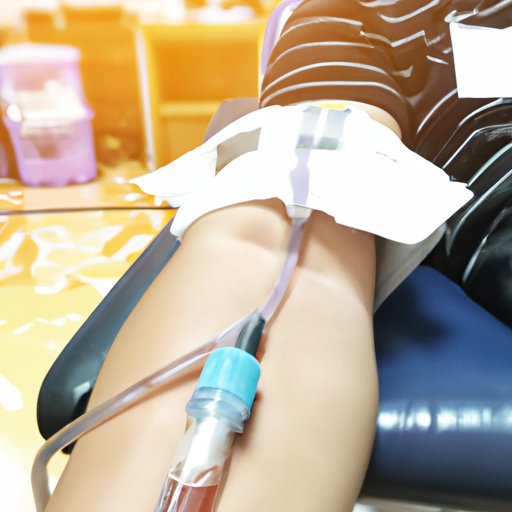
I. Introduction
Blood donations are crucial for saving lives and sustaining community health. Every year, millions of people in need depend on the generosity of others to maintain healthy blood levels. However, not everyone is eligible to donate blood, and certain circumstances can pose risks to both donors and recipients. One of the most common concerns is the deferral period required after getting a tattoo.
A. Background information about blood donation and tattoos
The connection between tattoos and blood donation is rooted in the risk of bloodborne infections. When a needle penetrates the skin to deposit ink, it creates an open wound that can transmit bacteria or viruses if not cared for properly. This poses a potential risk to the recipient of donated blood if the donor has an undetected infection.
B. Importance of understanding the risks and eligibility criteria for blood donation after getting a tattoo
It is important for individuals to understand the risks associated with donating blood after getting a tattoo to protect both themselves and potential recipients. Failure to comply with eligibility criteria or proper aftercare practices can compromise the safety of donated blood and hinder efforts to provide life-saving resources to those in need.
C. Purpose of the article
The purpose of this article is to help readers understand why they cannot donate blood after getting a tattoo, the waiting period required, and the importance of proper aftercare. It also discusses alternative ways to contribute to blood donation efforts and debunks common myths about eligibility criteria to encourage readers to prioritize their health and support the cause of blood donation.
II. The Truth About Donating Blood After a Tattoo: What You Need to Know
A. Explanation of why individuals with recent tattoos are deferred from donating blood
The primary reason individuals with recent tattoos are deferred from donating blood is the risk of infection. The deferral period gives the body time to heal and reduce the risk of transmitting bacteria or viruses through donated blood. Additionally, new tattoos can cause unwanted reactions in some individuals, such as excessive bleeding or swelling, which can put them at increased risk during the donation process.
The risk of infection during blood donation is particularly concerning due to the potential for transmission of hepatitis B and C, HIV, and other bloodborne illnesses. Even if the donor does not exhibit symptoms of an infection, the presence of these microbes can still be detected in donated blood and pose a serious risk to transfusion recipients.
B. Discussion of the waiting period required before becoming eligible again
The waiting period required before becoming eligible to donate blood again depends on several factors, including the type and location of the tattoo and individual health factors that impact the healing process. The American Red Cross and other blood donation organizations typically require a deferral period of at least 120 days or four months after getting a tattoo in most cases. However, this can vary depending on the individual circumstances.
The healing process after getting a tattoo also depends on the tattoo artist’s skill and the aftercare practices performed by the individual. Tattoos that are not cared for properly or placed in areas where skin is especially thin or sensitive may require additional time to heal to reduce the risk of infection.

III. Tattoos and Blood Donation: What You Can Do Instead
A. Alternative ways to contribute to blood donation efforts
Donating blood is not the only way to support efforts to save lives with healthy blood. Some alternative ways that individuals can contribute include:
- Hosting a blood drive to raise awareness and encourage others to donate
- Volunteering at a donation center to assist with screening donors and managing the logistics of the process
B. Importance of supporting the cause of blood donation
Regardless of whether an individual is eligible to donate blood, it is important to support the cause of blood donation and advocate for safety and transparency in the process. Supporting blood donation efforts can help ensure that patients in need have access to life-saving resources, and promote responsible practices that protect the health of both donors and recipients.
IV. The Importance of Tattoo Aftercare to Ensure Safe Blood Donation
A. Explanation of proper aftercare practices for newly-inked tattoos
Proper aftercare practices can make a significant difference in reducing the risk of infection and speeding up the healing process. A few things individuals can do to care for their new tattoos include:
- Cleaning the area thoroughly with soap and warm water and patting dry with a clean towel
- Applying a thin layer of antibiotic ointment and covering with a sterile bandage
- Avoiding exposure to direct sunlight, soaking in water, or wearing tight, restrictive clothing that may irritate the area
- Following any specific instructions provided by the tattoo artist regarding aftercare
B. Potential complications from inadequate aftercare and the impact on eligibility for blood donation
Inadequate aftercare can lead to a range of complications, including infections, scarring, and other skin irritations that can impact eligibility for blood donation. Failing to clean the area properly or remove the bandage too early can increase the risk of bacterial growth and damage to surrounding tissue.
Individuals who experience any adverse reactions or complications during the healing process should seek medical attention as soon as possible and avoid donating blood until they receive clearance from a healthcare professional.
V. Changing Minds: Debunking the Myths About Blood Donation and Tattoos
A. Common misconceptions about donating blood after getting a tattoo
There are several common misconceptions surrounding the eligibility criteria for donating blood after getting a tattoo, including:
- Tattoos automatically disqualify individuals from donating blood
- Donating blood after getting a tattoo is unsafe for both donors and recipients
B. Addressing these misconceptions with reliable information
While getting a tattoo can impact eligibility for blood donation, it does not necessarily disqualify individuals from contributing. Donors who follow proper aftercare practices and observe the waiting period required by blood donation organizations can still safely donate blood and help save lives.
It is also important to note that blood donation organizations place a high priority on safety and transparency in the donation process. Before donating blood, donors are screened for potential risk factors that could impact the safety of donated blood, including recent tattoos and other potential exposure to infectious diseases.
VI. Donating Blood Saves Lives: Why Prioritizing Health Matters
A. Emphasizing the crucial role of blood donation in saving lives
Donating blood is an essential component of maintaining a healthy community and providing life-saving resources to those in need. Every day, patients undergoing surgeries, receiving cancer treatment, and managing chronic illnesses rely on donated blood products to stay alive.
B. Encouraging readers to prioritize their health and the health of others by following guidelines for blood donation eligibility
By prioritizing their health and practicing responsible aftercare practices, individuals can help ensure that they are eligible to donate blood and support efforts to save lives. It is important to follow the guidelines set by blood donation organizations and provide accurate information to screening personnel to ensure the safety and efficacy of donated blood.
VII. The Role of Blood Donation Organizations in Ensuring Safe and Clean Blood
A. Explanation of the regulatory efforts by blood donation organizations
Blood donation organizations, such as the American Red Cross and America’s Blood Centers, are responsible for regulating and managing the blood supply chain to ensure the safety and quality of donated blood. These organizations establish guidelines and protocols for screening donors, preserving and transporting donated blood products, and managing the distribution of blood products to medical facilities.
B. Highlighting the guidelines and procedures for ensuring safe donated blood
To ensure the safety and efficacy of donated blood, blood donation organizations adhere to strict protocols for microbiological screening and testing. Each donated blood product undergoes testing for infectious diseases, including HIV, hepatitis B and C, and West Nile virus, among others. Donors are also required to undergo a thorough screening process to identify potential risk factors for infection or other health conditions that may impact the safety of donated blood.
VIII. From Body Art to Life-Saving Act: The Journey to Donating Blood Post-Tattoo
A. Personal experiences and testimonies of individuals who have navigated the waiting period to donate blood after a tattoo
Many individuals have successfully navigated the waiting period required by blood donation organizations to donate blood after getting a tattoo. By prioritizing their health and investing in proper aftercare, these donors were able to safely contribute to efforts to save lives.
B. Encouragement for readers to consider their potential impact on others by donating blood
By donating blood, individuals can make a tangible impact on the lives of those in need and support efforts to create healthy, thriving communities. It is important to prioritize health and abide by the eligibility criteria and guidelines set forth by blood donation organizations to ensure the safety and efficacy of the blood supply chain.
IX. Conclusion
A. Recap of the key points covered in the article
Donating blood after getting a tattoo is more complicated than it seems. To ensure the safety and efficacy of donated blood, blood donation organizations require a deferral period and adherence to proper aftercare practices. However, individuals can still support blood donation efforts through alternative means and prioritize their health to become eligible to donate in the future.
B. Call to action for readers to prioritize their health and support the cause of blood donation
By prioritizing their health and supporting the cause of blood donation, individuals can help create healthy, thriving communities and provide life-saving resources to those in need. Whether through donating blood, hosting a blood drive, or volunteering at a donation center, there are many ways to contribute to this vital effort.
C. Final thoughts and future implications for safety and eligibility regulations in blood donation
As the demand for donated blood products continues to rise, it is crucial to prioritize safety and transparency in the blood donation process. Blood donation organizations must work together to establish clear guidelines and protocols for eligibility and screening to ensure the safety and efficacy of donated blood.





